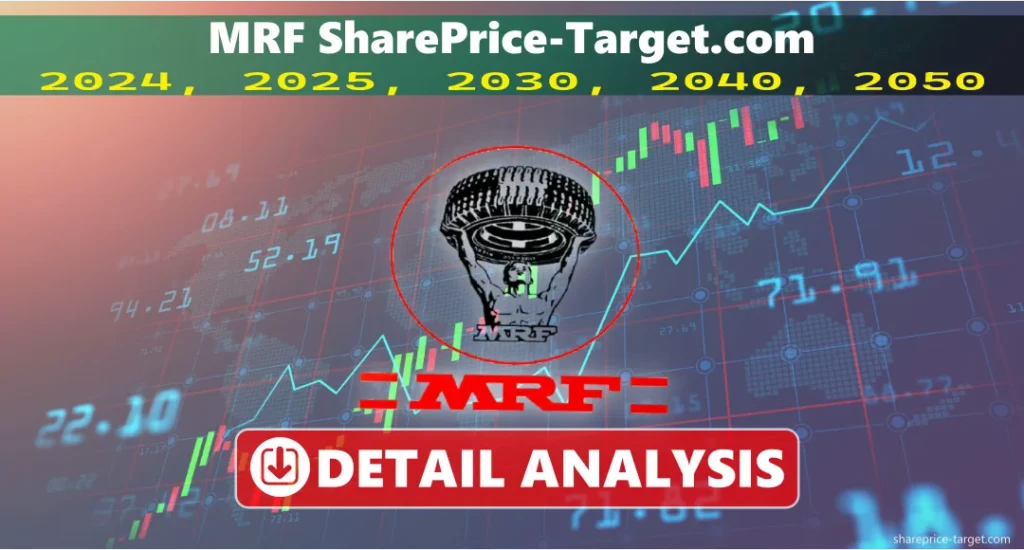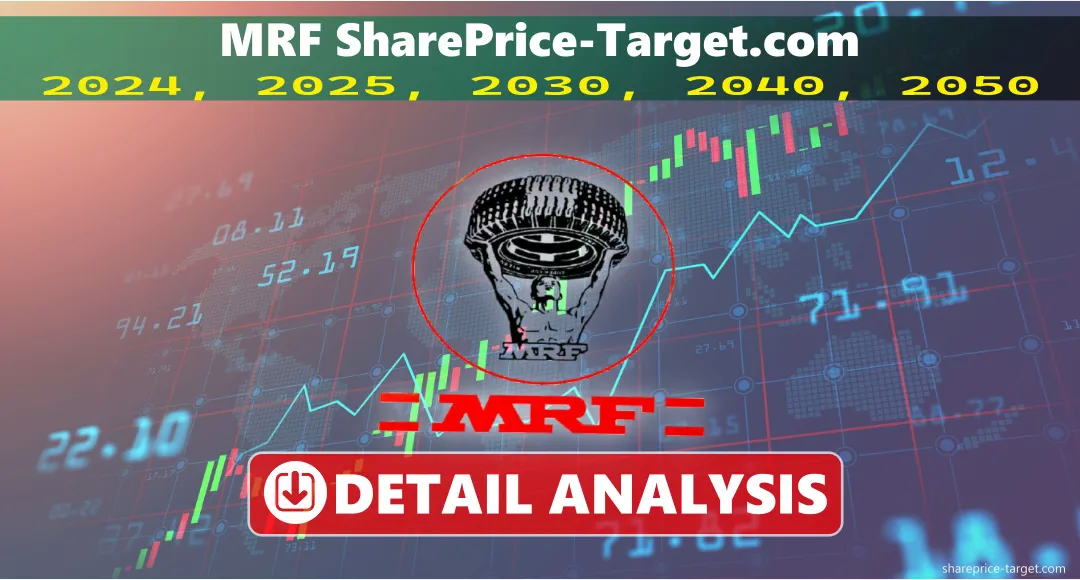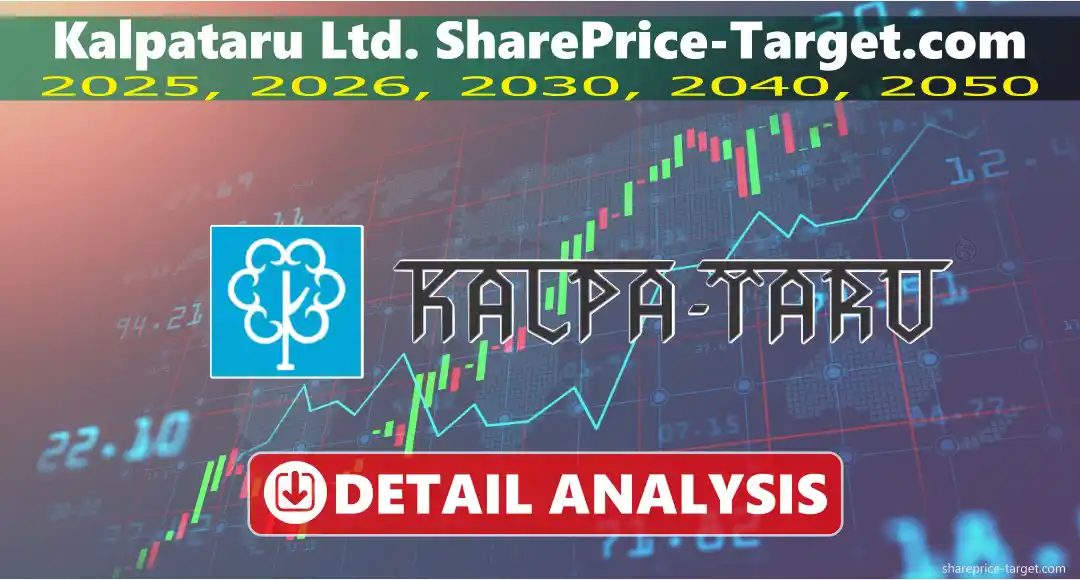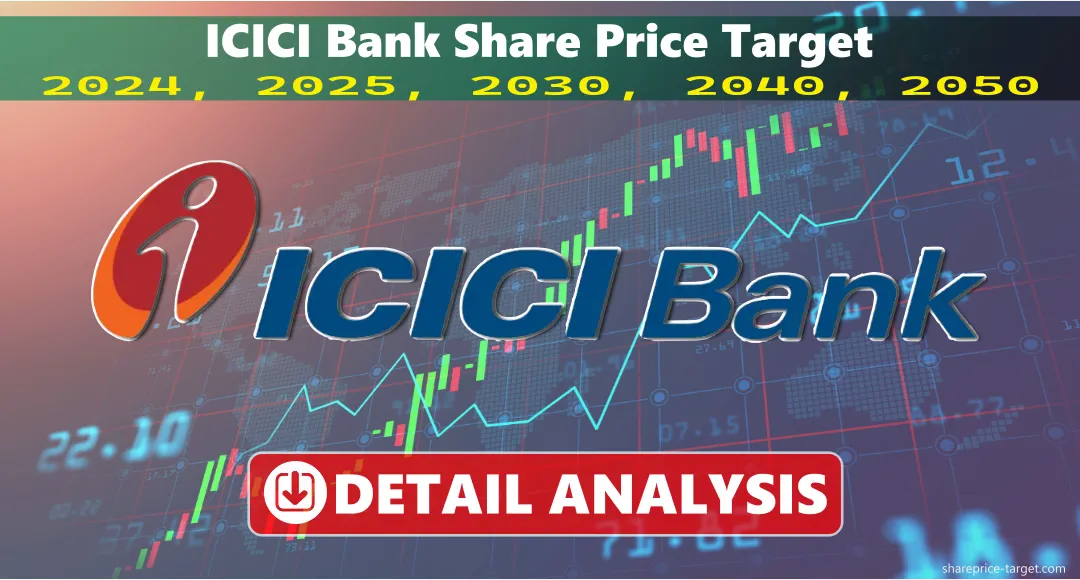MRF Share Price Target 2026, 2027, 2030, 2040, 2050
Investors have focused on MRF’s share price, indicating the company’s strong position in the automobile tyre business. MRF’s stock value is expected to rise significantly in 2024, 2025, 2026, 2030, 2040, and 2050, according to experts. These estimates are based on solid fundamentals including rising sales and profit margins and targeted expansions in local and foreign markets.
The expected expansion reflects MRF’s capacity to react to shifting market conditions and customer needs as well as prior success.
- 1 What Is MRF Ltd Nse: MRF?
- 2 MRF Share Price
- 3 Share Price Target 2026
- 4 Share Price Target 2030
- 5 Share Price Target 2040
- 6 Share Price Target 2050
- 7 Should I Buy MRF Stock?
- 8 MRF Ltd Earning Results
- 9 Expert Forecasts On The Future Of MRF Ltd.
- 10 Is MRF Stock Good To Buy? (Bull Case & Bear Case)
- 11 Conclusion
- 12 FAQs
- 13
Fundamental Table
| Metric | Value |
| Market Capitalization | ₹57,223.09 crore |
| PE Ratio | 27.49 |
| Debt to Equity Ratio | 16.89 |
| Return on Equity (ROE) | 13.25% |
| Book Value per Share | ₹138 |
| Dividend Yield | 0.15% |
| Total Debt | ₹2,821.5 crore |
| EBITDA (Quarterly) | ₹1,243.66 crore |
| Revenue (FY24) | ₹25,169 crore |
| Face Value | ₹10 |
Key Metrics Table
| Key Metric | Value |
| PE Ratio | 26.60 |
| EPS (TTM) | ₹4,865.43 |
| Price/Sales Ratio | 2.25 |
| Price to Book Ratio | 3.21 |
| Beta | 0.77 |
| 52 Week High/Low | ₹1,51,445 / ₹1,07,008 |
Peers and Comparison
| Company | Market Cap (₹ Cr) | PE Ratio | ROE (%) | Dividend Yield (%) |
| MRF Ltd | 57,223.09 | 27.49 | 13.25 | 0.15 |
| Apollo Tyres | 29,000 | 20.00 | 12.00 | 0.50 |
| Ceat Ltd | 10,500 | 18.50 | 11.50 | 1.00 |
| JK Tyre & Industries Ltd | 8,500 | 15.00 | 10.00 | 1.20 |
| Balkrishna Industries Ltd | 25,000 | 22.00 | 14.00 | 0.80 |
What Is MRF Ltd Nse: MRF?
MRF Ltd, or Madras Rubber Factory Limited, is a major Indian tyre, tube and rubber goods manufacturer and retailer. MRF, founded in 1946, is one of India’s leading tire producers, making tires for automobiles, lorries, and two-wheelers. The firm is listed on the NSE and BSE, indicating its large involvement in the Indian automotive component market.
MRF is a prominent industry company with a market capitalisation of about ₹57,223.09 crore. With a PE ratio of 27.49 and a ROE of 13.25%, the firm is doing well. MRF’s quality and innovation have kept it ahead of the competition. The firm has also expanded into sports items and rubber products, strengthening its market position.
Experts see a bright future for MRF in 2026 as the company builds on its already substantial market share and takes advantage of new technology developments. In 2026, its share price target would be ₹178083, as per stock market analysts.
According to stock market analysts, its share price would be between ₹143826 to ₹178083 in 2026.
| Year | Minimum Price (Rs) | Maximum Price (Rs) |
| 2026 | 143826 | 178083 |
| Month | Minimum Price (Rs) | Maximum Price (Rs) |
| January | 146283 | 158339 |
| February | 145125 | 162144 |
| March | 143826 | 164520 |
| April | 149640 | 165870 |
| May | 157540 | 166047 |
| June | 160670 | 168641 |
| July | 163964 | 170254 |
| August | 165254 | 173247 |
| September | 167450 | 174565 |
| October | 168365 | 175561 |
| November | 170057 | 176694 |
| December | 174358 | 178083 |
The increasing demand for tires in both the local and global markets is an opportunity that MRF hopes to seize by 2030. With a second aim of 3,85,500 ₹, the estimated first target is roughly 3,70,400 ₹. Prices are expected to range from ₹2,30,540 to ₹2,88,230 as market dynamics evolve.
| Year | Minimum Price (₹) | Maximum Price (₹) |
| 2030 | 2,30,540 | 3,85,500 |
| Month | Minimum Price (₹) | Maximum Price (₹) |
| January | 2,30,540 | 2,48,780 |
| February | 2,40,000 | 2,56,620 |
| March | 2,50,000 | 2,65,000 |
| April | 2,60,000 | 2,75,000 |
| May | 2,70,000 | 2,80,000 |
| June | 2,80,000 | 2,90,000 |
| July | 2,90,000 | 3,00,000 |
| August | 3,00,000 | 3,10,000 |
| September | 3,10,000 | 3,20,000 |
| October | 3,20,000 | 3,30,000 |
| November | 3,30,000 | 3,40,000 |
| December | 3,70,400 | 3,85,500 |
In the years leading up to 2040, MRF anticipates substantial returns on its strategic investments in innovation and sustainability. For this year, the first objective is anticipated to be ₹6,00,000, while the second objective has the potential to reach ₹7,00,000. The expected price range is 5,00,000 to 7,50,000 rupees.
| Year | Minimum Price (₹) | Maximum Price (₹) |
| 2040 | 5,00,000 | 7,50,000 |
| Month | Minimum Price (₹) | Maximum Price (₹) |
| January | 5,00,000 | 5,20,000 |
| February | 5,10,000 | 5,30,000 |
| March | 5,20,000 | 5,50,000 |
| April | 5,30,000 | 5,60,000 |
| May | 5,40,000 | 5,70,000 |
| June | 5,50,000 | 5,80,000 |
| July | 5,60,000 | 6,00,000 |
| August | 5,80,000 | 6,10,000 |
| September | 6,00,000 | 6,30,000 |
| October | 6,20,000 | 6,50,000 |
| November | 6,40,000 | 6,70,000 |
| December | 6,50,000 | 7,50,000 |
With the help of emerging technologies like electric cars, MRF plans to maintain its dominant position in the tyre sector until 2050. roughly ₹12,15,500 is the first aim, and roughly ₹12,45,800 is the second. The expected price range is ₹10,00,000 to ₹13,40,000.
| Year | Minimum Price (₹) | Maximum Price (₹) |
| 2050 | 10,00,000 | 13,40,000 |
| Month | Minimum Price (₹) | Maximum Price (₹) |
| January | 10,00,000 | 10,20,000 |
| February | 10,50,000 | 10,80,000 |
| March | 11,00,000 | 11,30,000 |
| April | 11,50,000 | 11,80,000 |
| May | 12,00,000 | 12,20,000 |
| June | 12,20,000 | 12,40,000 |
| July | 12,40,000 | 12,60,000 |
| August | 12,60,000 | 12,80,000 |
| September | 12,80,000 | 13,00,000 |
| October | 13,00,000 | 13,20,000 |
| November | 13,20,000 | 13,40,000 |
| December | 12,15,500 | 12,45,800 |
Should I Buy MRF Stock?
Recent performance, market circumstances, and expert analysis must be considered while buying MRF stock. MRF’s share price may fall owing to increased commodity prices and a perceived competitive weakness. Motilal Oswal Financial Services analysts estimate a 31% fall due to a ‘Sell’ rating, with targets ranging from ₹97,000 to ₹1,08,0001.
| Year | Minimum Price (₹) | Maximum Price (₹) |
| 2026 | ₹143826 | ₹178083 |
| 2030 | ₹2,30,540 | ₹3,85,500 |
| 2040 | ₹5,00,000 | ₹7,50,000 |
| 2050 | ₹10,00,000 | ₹13,40,000 |
Despite reporting 12% revenue increase in Q1FY25 and a strong market position, worries regarding the company’s pricing strength in key categories and growing raw material prices may restrict its profitability. The company is selling at a greater value than its historical norms, raising worries about its investment potential.
Additionally, investors should evaluate market circumstances and their investing plan. MRF has historically exhibited resiliency and growth potential, but market dynamics recommend caution. Waiting for better circumstances or clearer recovery indications before buying may be wise.
MRF Ltd Earning Results
| Quarter | Net Sales (₹ Cr) | Operating Profit (₹ Cr) | Net Profit (₹ Cr) | Tax (₹ Cr) |
| Jun ’24 | 7,077.84 | 1,138 | 562.55 | 188.33 |
| Mar ’24 | 6,215.05 | 886 | 379.55 | 128.36 |
| Dec ’23 | 6,047.79 | 1,039 | 508.02 | 171.22 |
| Sep ’23 | 6,087.56 | 1,129 | 571.93 | 201.53 |
| Jun ’23 | 6,323.28 | 1,114 | 581.45 | 196.90 |
Expert Forecasts On The Future Of MRF Ltd.
Growing commodity prices and competition have experts split on MRF Ltd (NSE: MRF) prospects. Important forecasts and insights:
Over the next five years, MRF should raise earnings by 7.9% and sales by 7.4%. We expect 7.8% EPS growth and 12.2% ROE in three years.
Motilal Oswal analysts said MRF’s stock is trading at 29.5x for FY25 and 25.2x for FY26, above its historical average of 23x. A ‘Sell’ rating and target price of ₹1,08,000 suggest a 31% decrease from current levels owing to overvaluation and a worse competitive position.
The 10-15% price increase of natural rubber threatens MRF’s profit margins. Truck, bus, and two-wheeler demand has been strong, but analysts expect margins to stay low due to inadequate pricing increases to offset rising raw material costs.
Despite these challenges, experts believe MRF may continue to gain domestic market share due to modest price increases in key sectors. Improving export market circumstances and consistent replacement market demand could boost FY25 revenue by 12%.
After Q1FY25 sales growth above expectations, brokerages raised MRF profit forecasts. Kotak Institutional Equities boosted its FY2025-27 consolidated EPS predictions by 8% despite headwinds, suggesting confidence in revenue growth and cost savings.
Is MRF Stock Good To Buy? (Bull Case & Bear Case)

Bull Case
- MRF’s brand image and market dominance in the Indian tyre business may maintain demand.
- Analysts expect FY25 revenue to climb 12% due to robust truck, bus, and two-wheeler performance.
- The firm expects improving export market conditions to boost revenue.
- MRF’s innovation and product variety may provide it an advantage and attract new consumers.
- As commodity prices stabilise, margins may improve despite present hurdles.
Bear Case
- Rising commodity prices, especially natural rubber, may lower business margins and profits.
- Analysts have given ‘Sell’ recommendations, with target prices predicting a 31% drop from present levels.
- MRF’s stock is trading at a high valuation (PE ratio of 29.5x), which may not be justified given its weakening competitive position.
- Recent net profit and operating margin declines raise worries about future profitability.
- Competition from Apollo Tyres and CEAT may further reduce MRF’s market share.
Conclusion
In conclusion, MRF’s share price estimates bode well for investors. Targeted pricing of ₹1,55,000 in 2024 and ₹3,85,500 by 2030 indicate continuing increase for MRF. Potential investors should evaluate market circumstances and business performance like any investment. As MRF innovates and grows, its values should rise by 2040 and 2050.








